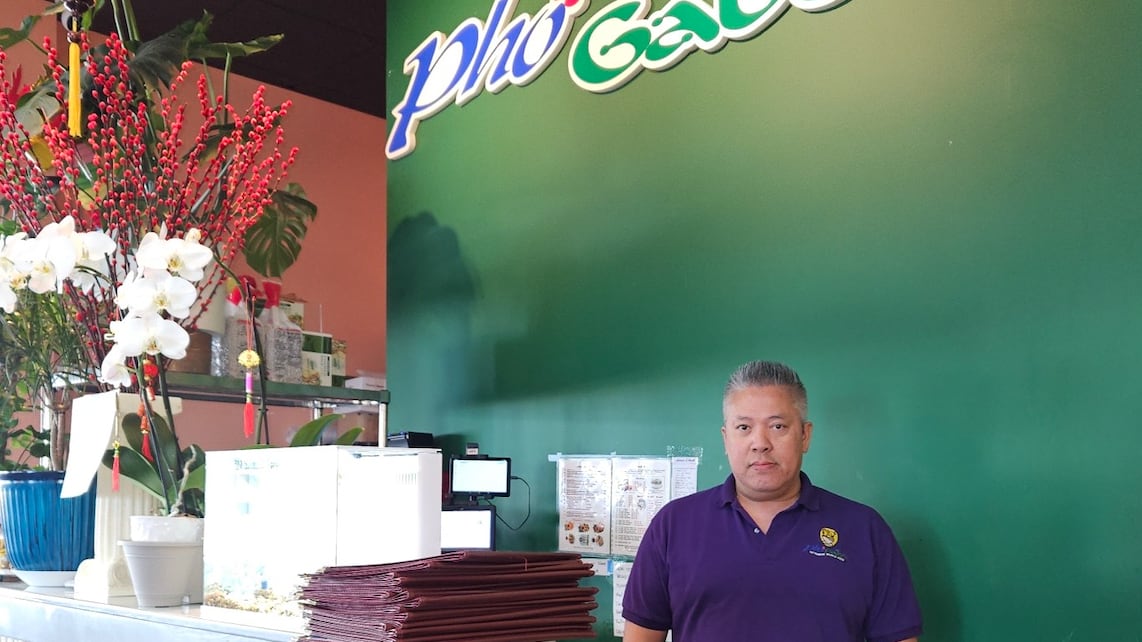Roseway diners hoping to pop in to Pho Gabo at Northeast 73rd Avenue and Fremont Street for a comforting bowl of beef noodle soup this month have been met with some unexpected news duct-taped to the door.
“Due to the city’s and the neighborhood’s complaints about the smell of the food that we grill and the foods that we serve customers we are temporarily closing this location.”
The sign hints at an 18-month saga that embroiled the Fremont Street location of the Vietnamese restaurant, a persistent neighbor with olfactory sensitivities, and the city’s Bureau of Development Services.
In September 2022, Pho Gabo owner Eddie Dong received a notice that his restaurant—one of three Pho Gabo locations he operates, including Happy Valley and Hillsboro locations—was in violation of the zoning code that prohibits odors impacting a nearby residential neighborhood.
Dong was surprised; he had been there for five years and had no complaints. Plus, 7330 NE Fremont St. had been a restaurant serving Asian cuisine for 30 years.
“The city got a complaint from one of the neighbors that every time they come out, they can’t stand the smell of the grill and the meat,” Dong says.
He says he does not know the identity of the neighbor who complained; he or she is listed in the city documents simply as “COM.”
According to records released to WW, city inspectors made a dozen site visits to Pho Gabo over the last year and a half and detected food smells at almost every one.
“The odors detected smell like a wok dish,” an inspector wrote in October.
“COM left a [voicemail] in the evening that odors are still occurring around lunchtime and dinnertime,” city planner Justin Lindley of the Bureau of Development Services noted in May.
“The smells intensified near the restaurant but were still easily discernible five houses away and across the street,” Lindley wrote last February. “I spoke with a contractor working on the new homes down the street. The contractor stated they could smell the odors from the restaurant every day.”
Lindley says some of the most common food odors he investigates are food carts and barbecue restaurants that have exterior grills.
“I love the smell of barbecue, but if you live next door and your house is inundated with odors all day long, that is a lot,’” Lindley says.
There is no official machine that inspectors use to measure smells, like a decibel meter measures sound. The threshold for a violation is “any detectable odor” based on the inspector’s own nose, Lindley says.
Dong looked into his options to remedy the situation. He hired a cleaning service to do a deep clean of the exhaust system—”it didn’t do any good,” he says. He researched charcoal filters as a cost-effective solution. To minimize the cooking smells, he started only grilling meats at the other Pho Gabo locations and then driving them to the Fremont Street restaurant.
A contractor recommended a $40,000 filtration system as his best bet. He couldn’t afford it.
Meanwhile, COM, the anonymous complainer, kept in close touch with Lindley at the Bureau of Development Services. On Dec. 26, COM emailed requesting the status on the violation and reported that “the odors were very bad over the weekend and caused residents to leave the area.”
With pressure continuing unabated from COM and unpaid fines from the city threatening to double every month, Dong closed the location Feb. 3. COM’s wish might’ve been granted, but others weren’t pleased. According to Dong, on the Fremont location’s last day, one regular customer ate there four times to try to get their final pho fix.
“The customers are not happy,” Dong says. “Some of them have been walking here for years.”
Scott Everist is Dong’s landlord at the restaurant—he also lives about 500 yards from Pho Gabo. His father and uncle constructed the building themselves in 1962 and used it as an auto parts shop.
“The community has been changing and a lot of the Vietnamese businesses are disappearing,” Everist says. “Eddie’s been a really good tenant here, and I’m really kind of sad about this thing.”
Everist, who is in his 70s, owns the property with his brother and sister. The siblings are looking to sell. Dong’s lease is not up until next January, but Everist is giving him some wiggle room with the rent. (“I’m not a hard-nosed guy,” he says.)
Given the odor complaints and the nine times Pho Gabo was broken into (like so many small businesses in Portland, Pho Gabo’s front door has a sign that says, “Please do not break windows/doors. NO MONEY INSIDE. Thank you!”), Everist understands why Dong’s other properties are in the ‘burbs.
“I’ve been looking for another location since I knew this would happen,” Dong says, referring to the impending closure. “I haven’t found anything yet.”
Loyal customers can still find Pho Gabo in Happy Valley and Hillsboro.

